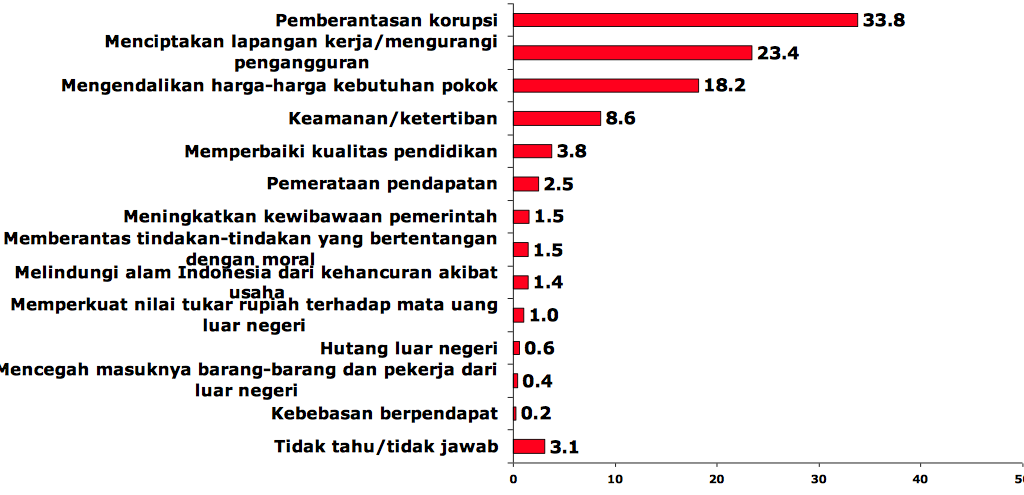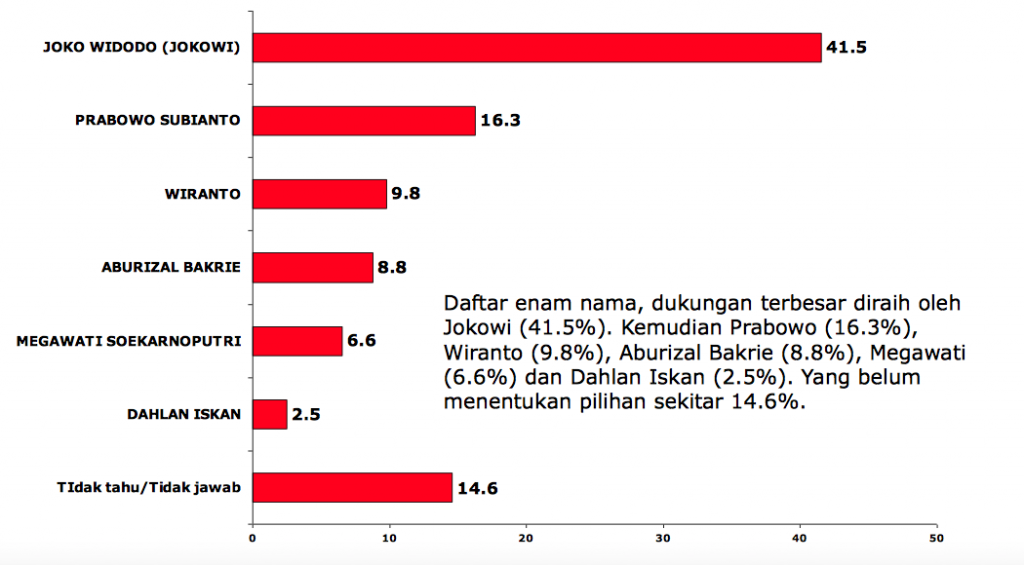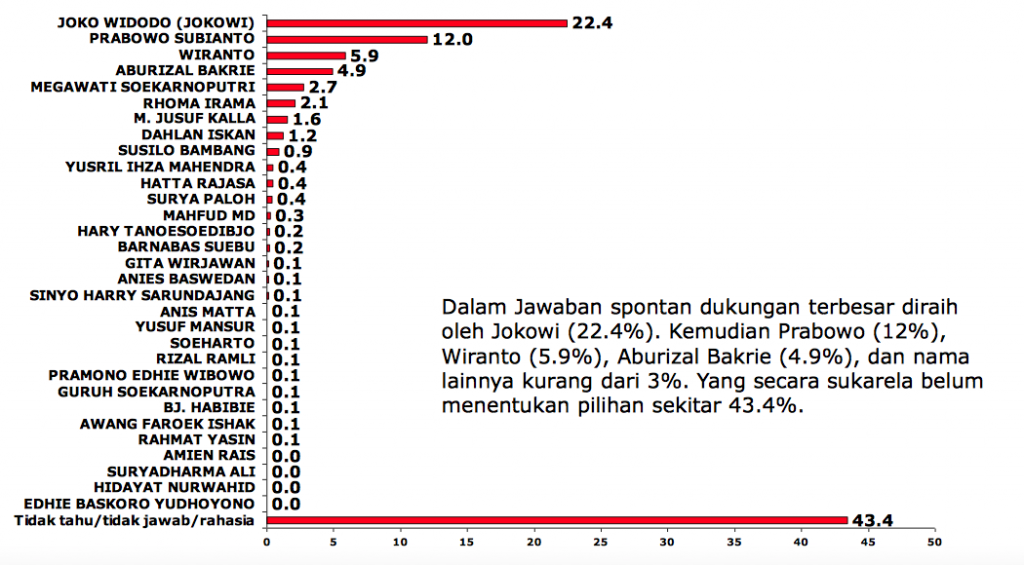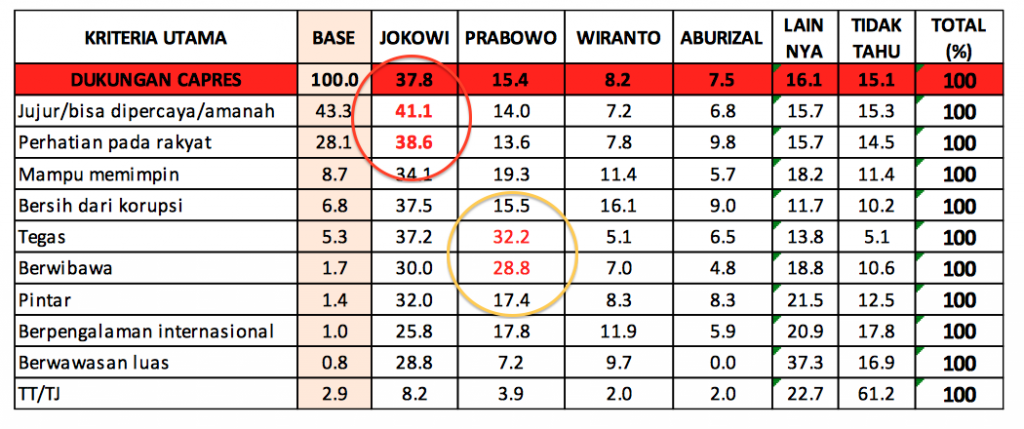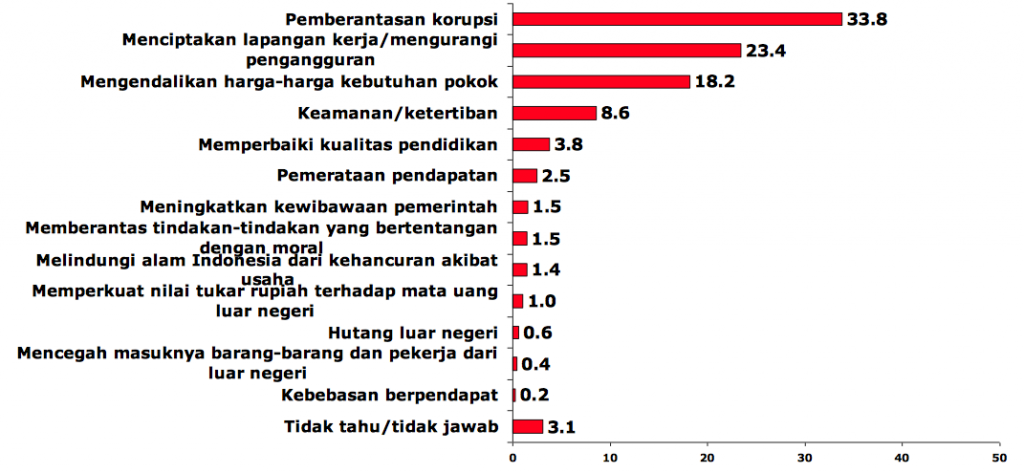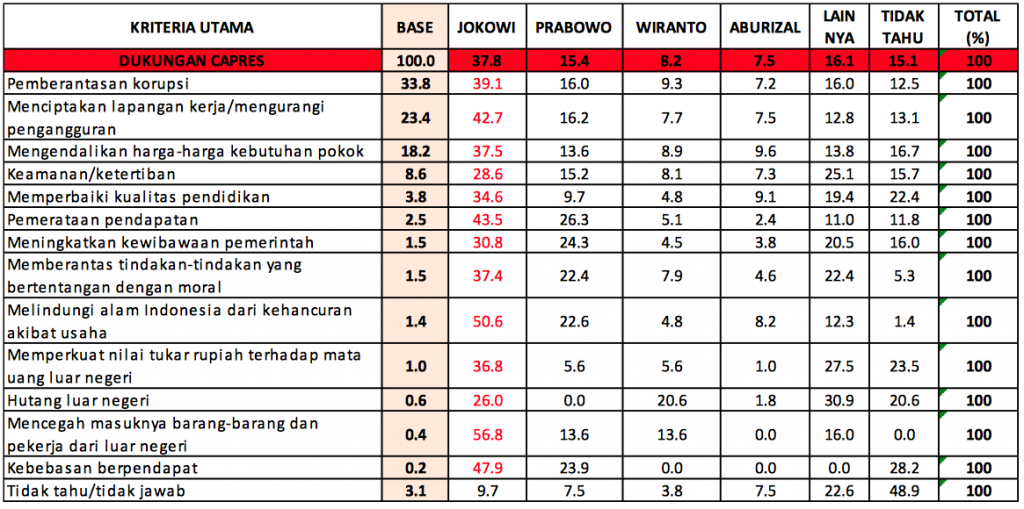Indikator Politik Indonesia, a Jakarta polling and political consultancy firm, released some survey results yesterday which do a good job of showing where the 2014 elections are starting out from.
There’s a lot of great data in the presentation, and if you understand Bahasa Indonesia you can download the PDF here, but I’ll pull out the most important information and put it in English.
Firstly, who’s winning?
When punters were asked to choose between the six most likely candidates, the results look like this:
That’s Jokowi way out in front on 41.5%, a whopping 25 point lead over Prabowo. What’s interesting is that the Soeharto-era armed forces chief Wiranto has made at least some progress: he’s now in a dead heat with the current proprietor of the Golkar candidacy, the business tycoon Aburizal Bakrie. Wiranto’s move to team up with the media tycoon Harry Tanoesoedibjo (which Ross Tapsell talked about) seems to have helped him out.
Tickets for the presidential race don’t have to be lodged with the election authority until June, so who’ll be in the presidential race is, in theory, up in the air. For this reason, it’s common for pollsters in Indonesia to ask a ‘top of mind’ question–i.e. voters aren’t given a list of candidates to choose from, but are asked to simply name the person they like best.
The chart above shows Jokowi still winning the top of mind question, sitting on 22.4%–followed by daylight, then followed by Prabowo Subianto on 12%. Look at the number at the bottom: that’s 43.4% of respondents answering ‘don’t know/didn’t respond/secret’. Some of the electoral non-entities filling out the bottom two thirds of that list include the president, his son (oh, how the mighty have fallen: Jacqui Baker posted about the decline of SBY’s Demokrats yesterday), plus various Islamic politicians and other has-beens. 0.1% picked the (dead and buried) former dictator Soeharto–nostalgia for the New Order comes with a sense of humour.
Second question: what are voters looking for in a presidential candidate?
The chart above shows that, when asked to name the qualities they think are most important in a president, 43.3% of respondents named ‘honest/can be trusted/amanah’. Amanah in Indonesian politics is an interesting concept, and something we’ll surely blog about here at Indonesia Votes in the future. It’s an Islamic term connoting a kind of trustworthiness, professionalism or honour related to the exercise of entrusted authority (if anybody has a better description, do please leave a comment). A big part of the Prabowo campaign’s messaging against Jokowi, for instance, will be that he has not displayed amanah in ‘abandoning’ his constituency in Jakarta to run for president. But that’s another story. 28.1% named ‘cares for the people’ as their most important quality, 8.7% said ‘capable of leading’, 6.8% said ‘free of corruption’ and 5.3% said ‘firm/tough’.
With more detail, it seems that the different political personae of the frontrunners, Jokowi and Prabowo, are attracting different types of voters.
In the red circle: roughly two thirds of respondents said their most important quality in a candidate was ‘honest/trustworthy/amanah‘ or ‘cares for the people’. Jokowi is doing well on this front. Now look at the yellow circle: only about 7% said they thought a candidates’ being tegas (firm/tough) or berwibawa (a term with Javanese roots which connotes authority or power). But most of those who did say they want to vote for Prabowo, the redoubtable former special forces general whose political persona and messaging has definitely played to this strength.
Finally, what issues do the voters care about?
Topping the list is ‘eradication of corruption’ on 33.8%, followed by ‘creating employment/reducing unemployment’ (23.4%), ‘controlling cost of staple goods’ (18.2%), ‘security/order’ (8.6%) and ‘improving the quality of education’ (3.8%).
The next table is one of the most interesting of the whole poll, and probably worth a post of its own. Respondents were asked to name the candidate whom they most trust to handle each of the issues above, and the results are unequivocal. Joko Widodo wins the trust of voters in every area, even on issues such as ‘foreign debt’ and ‘restraining the entry of goods and workers from abroad’ which Prabowo has been campaigning on for years. [UPDATE: Then again, what is also striking is just how few people named these economic nationalist issues as being the most important, which a) makes it more difficult to interpret the data b) kind of draws into question the media trope about how Indonesian voters are obsessed with protectionist policies.]
I hope this has been a useful little run down on what the polling says as the election kicks off. I’d love to hear your interpretations so leave a comment below to get the conversation started.
………
Liam Gammon is a PhD candidate at the Department of Political and Social Change at the Australian National University currently researching populism in contemporary Indonesia.
 Facebook
Facebook  Twitter
Twitter  Soundcloud
Soundcloud  Youtube
Youtube  Rss
Rss 